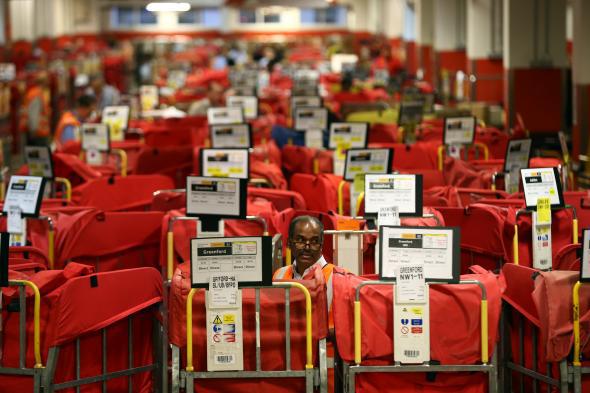This question originally appeared on Quora, the knowledge-sharing network where compelling questions are answered by people with unique insights. You can follow Quora on Twitter, Facebook, and Google Plus.
Answer by Stephen Tempest:
It dates back to the 1850s but adopted its current form in the late 1960s.
In Britain, Sir Rowland Hill set up the first national, uniform postal service using prepaid stamps in 1839. It was a stunning success, with the number of letters being sent nationwide more than doubling in the first three months after the introduction of the system.
By the 1850s, the post office was encountering major problems delivering mail in London, then the world’s largest city with a rapidly growing population. Letters were often vaguely addressed, a problem compounded by the frequent duplication of street names. There were, for example, 13 different Hamilton Roads as far apart as Brixton, Chiswick, and Golders Green—not to mention eight Hamilton Streets and nine Hamilton Terraces, just to confuse things further.
Sir Rowland Hill therefore introduced the first system of postcodes in London in 1856; it was phased in over the next two years. Initially there were ten postcodes: WC and EC (West Central and East Central) in the middle of town, then N, NE, E, SE, S, SW, W, and NW radiating out from them like the spokes of a wheel. A decade later some adjustments were made because two of the districts were felt to be too small compared with the others; in 1866 NE was merged with E, and in 1868 S was divided between SE and SW.
The 1860s also saw the post-code system first extended to other large cities within Britain. In 1864 Liverpool was the first outside London to be divided into post codes, with four districts. Manchester followed suit in 1868 with eight districts. Others followed, but even by the early 20th century the system was only found in the biggest cities. It saw expansion in 1932 with several medium-sized cities introducing postcodes as well.
It was not until 1917 that the London postal districts were split into numbered subdistricts (SW1, SW2, SW3, etc.). This was because most of the experienced postal workers had been sent to the trenches of Flanders, and hastily trained substitutes, most of them women, had been brought in to fill their roles. Each individual post office within a postal district was given an alphanumeric code, making it easier for inexperienced sorting workers to send post to the right place. The numbers were assigned in alphabetical order by the name of the post office within a district, not by geographical criteria, which is why, for example, SE1 is in the north-west of the SE district, but SE2 is far to the east at Abbey Wood, SE3 is more central at Blackheath, and SE4 is farther west at Brockley.
The post-code system was extended nationwide in the 1960s. It was at this point that the two-part post code was adopted: the “outward code” denoting the postal district, including the various already existing codes such as SW1 in London. This was followed by the new “inward codes” such as 1AA, which denote the individual street or locale within the district. SW1 1AA therefore means Postal District SW (out of around 120 postal districts in the U.K.), subdistrict 1 (there are usually about 20 subdistricts per district), Sector 1 (a sector usually contains about 300 unique addresses), Unit AA (a unit normally contains about 15 unique addresses).
A first trial of the new system was attempted at Norwich in 1959 with limited success; a more successful trial incorporating the lessons learned took place at Croydon in 1966, and then the system was rolled out progressively, region by region. By 1974 everywhere in the country had a post code. Optical character recognition equipment that can read a post code automatically without human input was introduced nationally in 1985.
How old is the UK’s current postcode system? originally appeared on Quora. More questions on Quora:
